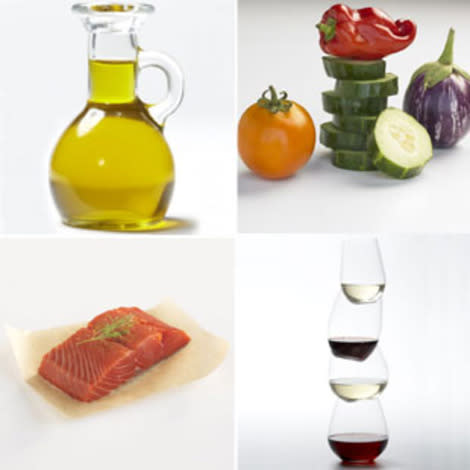9 Staple Foods of the Mediterranean Diet

By Brierley Wright, M.S., R.D., Nutrition Editor, EatingWell Magazine
Eating a Mediterranean diet may lower your risk of heart attack, stroke and death from heart disease by up to 30 percent, according to a new, highly publicized study out of Spain, published in April 2013 in The New England Journal of Medicine.
When older adult participants (aged 55 to 80 years) were divided into one of three groups (Mediterranean diet with extra-virgin olive oil, Mediterranean diet with nuts or a control diet), those who followed either of the Mediterranean diets reaped the heart-protective benefits.
Don't Miss: 8 Ways to Follow the Mediterranean Diet for Better Health
You can start eating the Mediterranean diet today--and help your heart health--by adding these key foods (which were staples in the diet of the study participants following the Mediterranean diet) to your meals.
1. Olive oil. The study participants' main culinary fat was olive oil--they ate 4 or more daily tablespoons of this oil, which is rich in heart-healthy monounsaturated fats. (Conversely, they ate less than 1 serving per day of saturated-fat-rich butter or cream.) Make olive oil your primary "fat" for cooking and baking and swap it in for butter whenever you can.
2. Nuts. Study participants ate 3 or more servings of nuts (including peanuts) weekly--and were encouraged to eat a daily serving of mixed nuts (walnuts, almonds and hazelnuts). To incorporate nuts, which are packed with heart-healthy fats, into your diet, try trading your afternoon snack for a (small) handful of nuts (remember: they're calorie-dense) or sprinkle them on top of your favorite yogurt or a salad.
3. Fish. Mediterranean-diet followers ate 3-plus servings of fish or shellfish weekly. Aim to add fish of any kind--except for fried, of course, and especially the oily ones, such as salmon or tuna, which are rich in those heart-healthy omega-3 fats--into your weekly regimen.
Don't Miss: 6 Fish and Shellfish to Eat--And 6 to Avoid
4. Legumes. Study participants reported eating 3 or more servings of legumes each week. Legumes include beans, peas and lentils and make for a good meat replacer because they're a great vegetarian source of protein. But they also count as a vegetable because they deliver fiber and nutrients, such as folate and potassium, that you'd find in other vegetables.
5. Fresh fruits. Fruits, including natural--or 100 percent--fruit juices, are also an important part of the Mediterranean diet. Followers consumed 3-plus fruit servings daily. If you're going to drink 100 percent juice to up your fruit intake, try and cap it at 8 to 12 ounces daily. Otherwise, you can add fruit to your diet in many ways: mix it into a salad or oatmeal, top your yogurt with fruit or just snack on it plain.
6. Fresh vegetables. Study participants reported eating 2 or more servings of vegetables each day--and at least one serving featured raw vegetables or a salad. Start your day out by adding vegetables to an omelet and have a bowl of vegetable soup or a salad (both of which are great ways to pack in several vegetable servings) for lunch or dinner.
7. Sofrito. Sofrito is a sauce made with tomato and onion and often includes garlic and herbs. It's slowly simmered with olive oil and is typically used to season vegetables, pasta and rice. Mediterranean diet followers said they ate sofrito 2 or more times per week.
8. White meat. In this Mediterranean diet study, subjects weren't told how much meat to eat but were simply encouraged to eat white meat instead of red meat (think: chicken or turkey breast instead of veal, pork, hamburger or sausage). And along those lines, participants reported eating less than one daily serving of red meat, hamburger or "meat product," such as ham, sausage, etc.
9. Wine. Mediterranean-diet followers consume wine with meals. Study participants--just those who habitually drank alcohol--reported drinking seven (or more) glasses per week, or about one drink a day, and didn't specify whether it was white or red wine.
Related: 9 More Healthy Foods from the Mediterranean Diet
Which of these Mediterranean foods are in your diet?
By Brierley Wright, M.S., R.D.

Brierley's interest in nutrition and food come together in her position as nutrition editor at EatingWell. Brierley holds a master's degree in Nutrition Communication from the Friedman School of Nutrition Science and Policy at Tufts University. A Registered Dietitian, she completed her undergraduate degree at the University of Vermont.
Related Links from EatingWell:
